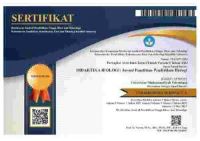PENERAPAN JURNAL BELAJAR DI MASA PANDEMI COVID-19: ANALISIS HASIL BELAJAR PADA MATA KULIAH STRATEGI PEMBELAJARAN (MODEL PEMBELAJARAN BIOLOGI)
Abstract
Kondisi pandemi memaksa pelaksanaan pendidikan dalam keterbatasan (dengan sistem online). Diterapkan penulisan jurnal belajar untuk membantu mahasiswa merefleksi kembali pengetahuan yang telah diperoleh, meskipun dalam kondisi tanpa tatap muka, mahasiswa tetap dapat memahami kesulitan yang ditemui saat proses pembelajaran. Penelitian ini bertujuan menganalisis penerapan jurnal belajar pada masa pandemi covid-19 terhadap hasil belajar mahasiswa. Jenis penelitian yang dilakukan adalah deskriptif dengan pelaksanaan di semester ganjil 2019/2020. Subjek penelitian adalah mahasiswa semester 5 yang mengikuti mata kuliah strategi pembelajaran (model pembelajaran biologi) yang dibagi menjadi kelas I dan II. Data dikumpulkan, diolah dan dianalisis dengan teknik deskriptif kuantitatif, yakni dengan membandingkan data antara kelas I (dengan jurnal belajar) dengan kelas II (tanpa jurnal belajar) dalam persentase. Hasil penelitian menunjukkan bahwa nilai akhir untuk kelas I adalah A= 48,15 %, A-= 40,74%, dan B+= 11,11 %, sedangkan kelas II dengan nilai A= 32,14%, A-= 51,85%, B+= 3,70%, dan B=11,11%. Dapat disimpulkan bahwa penerapan jurnal belajar di masa pandemi covid-19 memberikan kontribusi positif terhadap perolehan nilai akhir yang lebih baik bagi kelas I dibanding kelas II. Jurnal belajar mampu meningkatkan kemampuan mahasiswa untuk evaluasi diri dan memecahkan masalah yang dihadapinya sehingga mahasiswa dapat melacak kemajuan yang telah dicapainya.
The pandemic condition forced the implementation of education in limitations (with an online system). Learning journal writing was applied to help students reflect back on the knowledge that has been obtained, even in non-face-to-face conditions, students can still understand the difficulties encountered during the learning process. This study aimed to analyze the application of learning journal during the covid-19 pandemic on students’ learning outcomes. The type of the conducted study was descriptive with the implementation in the odd semester of 2019/2020 academic year. The study subjects were 5th semester students who took the learning strategy course (biology learning model) which was divided into classes I and II. Data were collected, processed and analyzed by quantitative descriptive technique, namely by comparing the data between class I (with study journal) and class II (without study journal) in percentages.The results showed that the final grades for class I were A= 48.15%, A-= 40.74%, and B+= 11.11%, while for class II were A= 32.14%, A-= 51, 85%, B+= 3.70%, and B=11.11%. It can be concluded that the application of learning journal during the covid-19 pandemic made a positive contribution to the acquisition of better final grades for class I compared to class II. The learning journal was able to improve students' ability to self-evaluate and solve the problems they face so that students can track their progress.
Keywords
Full Text:
PDFReferences
Alsa, A. (2005). Program Belajar, Jenis Kelamin, Belajar Berdasar Regulasi Diri dan Prestasi Belajar Matematika pada Pelajar SMA Negeri di Yogyakarta, Disertasi, tidak diterbitkan Yogyakarta: Fakultas Psikologi Universitas Gadjah Mada.
Andriyani, F. D., & Indra, E. N. (2017). Kontribusi Penggunaan Jurnal Belajar pada Pembelajaran. Jurnal Cakrawala Pendidikan, 36(2), 140–147. https://doi.org/10.21831/cp.v36i1.11976
Berardo, C. 2014. Alice in Writerland: Writing as a Therapeutic Tool and a Way to Understand Adolescent Needs. Transactional Analysis Journal, 44(1), 142-152. https://doi.org/10.1177/0362153714541950
Berthold, K., Nuckles, M., & Renkl, A. (2007). Do Learning Protocols Support Learning Strategies and Outcomes? The Role of Cognitive and Metacognitive Prompts. Journal of Learning and Instruction, 17(5), 564-577.https://doi.org/10.1016/j.learninstruc.2007.09.007
Butler, D. L., & Winne, P. H. (1995). Feedback and Self-Regulated Learning: A Theoretical Synthesis. Review of Educational Research, 65(3), 245–281. https://doi.org/10.2307/1170684
Cucus, A., Aprilinda, Y., & Endra, R. Y. (2016) Pengembangan E-Learning Berbasis Multimedia untuk Efektivitas Pembelajaran Jarak Jauh. Explore: Jurnal Sistem Informasi dan Telematika (Telekomunikasi, Multimedia dan Informatika), 7(2), 1–5.http://dx.doi.org/10.36448/jsit.v7i1.765
Febrianty, E. R., Simarmata, J., Suleman, A. R., Hasibuan, A., Purba, S., Butarbutar, M., & Saputra, S. (2020). Manajemen Perubahan Perusahaan di Era Transformasi Digital. Medan: Yayasan Kita Menulis. https://kitamenulis.id/
Connor-Greene, P. A. (2000). Making Connections: Evaluating the Effectiveness of Journal Writing in Enhancing Student Learning. Journal of Teaching of Psychology, 27(1), 44-46.https://doi.org/10.1207/S15328023TOP2701_10
Gugus Tugas Percepatan Penanganan (GTPP) Covid-19. (2020). Protokol Percepatan Penanganan Pandemi Covid-19 (Corona Virus Disease 2019).
Harris, K-L., Krause, K-L., Garnett, R., Gleeson, D., Peat, M., & Taylor, C. (2007). Enhancing The Assessment of Learning in Australian Higher Education: Biological Sciences. The Carrick Institute for Learning and Teaching in Higher Education. https://ltr.edu.au/resources/grants_2005project_biology_finalreport_0.pdf
Henderson, A. J. (2003). The E-Learning Question and Answer Book: A Survival Guide for Trainers and Business Managers. New York: American Management Association.
Hooey, C. A., & Bailey, T. J. (2005). Journal Writing and the Development of Spatial Thinking Skills. Journal of Geography, 104(6), 257–261. https://doi.org/10.1080/00221340508978647
Hopskin, G. (2021). Journal Writing Every Day: Teachers Say It Really Works! (In Journal Writing Every Day: A Painless Way to Develop Skills). Education World. Retrieved from: https://www.educationworld.com/a_curr/curr144.shtml
Hubner, S., Nukles, M., & Renkl, A., (2010). Writing Learning Journal: Instructional Support to Overcome Learning-Strategy Deficits. Journal Learning and Instruction, 20(1), 18-29.
Husamah. (2016). Penerapan Tugas Menulis Jurnal Belajar Terhadap Nilai Akhir Mahasiswa pada Mata Kuliah Pengantar Pendidikan FKIP-UMM. Prosiding Seminar Nasional II Tahun 2016, 1175–1181. Universitas Muhammadiyah Malang.
Husamah, Pantiwati, Y., Restian, A., & Sumarsono, P. (2016). Belajar & Pembelajaran. Malang: UM Press.
Jadhav, V. R., Bagul, T. D. & Aswale, S. R. (2020). ‘COVID- 19 Era: Students ’ Role to Look at Problems in Education System during Lockdown Issues in Maharashtra, India. International Journal of Research And Review, 7(5), 328–331.
Kartono, & Imron, A. (2011). Penerapan Teknik Penilaian Learning Journal pada Model Pembelajaran Berbasis Masalah untuk Meningkatkan Hasil Belajar Siswa Materi Pokok Segiempat. Kreano: Jurnal Matematika Kreatif-Inovatif, 2(1), 57–71. https://doi.org/10.15294/kreano.v2i1.1246
Klien, S. R. (2010). Exploring Hope and the Inner Life Through Jurnaling. Education for Meaning and Social Justice, 23(1), 49-52.
Komalasari, G., & Karsih, W.E. (2011). Teori dan Teknik Konseling. Jakarta: PT Indeks.
Mahananingtyas, E. (2017). Hasil Belajar Kognitif, Afektif dan Psikomotor Melalui Penggunaan Jurnal Belajar Bagi Mahasiswa PGSD. Prosiding Seminar Nasional HDPGSDI Wilayah IV, 192–200.
Mahlanze, H. T., & Sibiya, M. N. (2017). Perceptions of Student Nurses On the Writing of Reflective Journals as A Means for Personal, Professional and Clinical Learning Development. Health SA Gesondheid, 22(1), 79–86. https://doi.org/10.1016/j.hsag.2016.05.005
Munawaroh, L., Pantiwati, Y., & Rofieq, A. (2016). Penggunaan Jurnal Belajar dalam Pembelajaran Class Wide Peer Tutoring Terhadap Kemampuan Berpikir Kritis Siswa. Jurnal Pendidikan Biologi Indonesia, 1(3), 263–273. https://doi.org/10.22219/jpbi.v1i3.2659
Nicols, J, D & Dick, D. M. (2006). Formative Assessment and Self-Regulated Learning: a Model and Seven Principles of Good Feed Back Practice. Studies in Higher Education, 31(2), 199-218.
Nie, Y., Yeo S. M., & Lau, S. (2007). Application of Generalizability Theory in The Investigation of The Quality of Journal Writing in Mathematics. Studies in Educational Evaluation, 33(1), 371-383.
Nuckles, M., Hubner, S., & Renkl, A., (2009). Enhancing Self-Regulated Learning by Writing Learning Protocols. Journal of Learning and Instruction, 19(1), 259-271.
Palmer, S. (2011). Konseling dan Psikoterapi. (Terjemahan Haris H. Setiadjid). Yogyakarta: Pustaka Pelajar.
Picca, L. H., Starks, B., & Gunderson, J. (2013). “It Opened My Eyes”: Using Student Journal Writing to Make Visible Race, Class, and Gender in Everyday Life. Teaching Sociology, 41(1),82–93. https://doi.org/10.1177/0092055X12460029
Sadikin, A., Aina, M., & Hakim, N. (2016). Penerapan Asesmen Berbasis Portopolio dan Jurnal Belajar Untuk Meningkatkan Kemampuan Metakognitif dan Motivasi Belajar Mahasiswa pada Mata Kuliah Perencanaan Pengajaran Biologi. Biodik, 2(2), 50–61.
Septiyana, K., Prasetyo, B. P. A., & Christijanti, W. (2013). Jurnal Belajar Sebagai Strategi Berpikir Metakognitif pada Pembelajaran Sistem Imunitas. Journal of Biology Education, 2(1), 1-9. Diakses dari https://journal.unnes.ac.id/sju/index.php/ujbe/article/view/2608
Setiawan, D., & Susilo, H. (2015). Peningkatan Keterampilan Metakognitif Mahasiswa antara Model Problem-Based Learning dengan Model Ekspoditori pada Matakuliah Evolusi. Prosiding Seminar Nasional Pendidikan Biologi, 1 (Maret), 359–369. Universitas Muhammadiyah Malang.
Schultz, C. (2009). Mathematical Communication and Achievement Through Journal Writing. Retrieved from:https://digitalcommons.unl.edu/mathmidsummative/27
Susantini, E. (2005). Strategi Metakognitif dalam Pembelajaran Kooperatif untuk Meningkatkan Kualitas Proses Pembelajaran Genetika di SMA. Jurnal Ilmu Pendidikan, 12(1), 62-75. Diakses dari http://journal.um.ac.id/index.php/jip/article/view/82
Susanto, H., (2006). Mengembangkan Kemampuan Self-Regulation untuk Meningkatkan Keberhasilan Akademik Siswa, Jurnal Pendidikan Penabur, 7(5), 64-71.
Syarif, H. S., & Munandar, H. (2018). Pengaruh Penggunaan Jurnal Belajar Terhadap Hasil Belajar Mahasiswa Pendidikan Biologi STKIP-PI Makassar pada Mata Kuliah Perencanaan Pembelajaran. Jurnal Biologi dan Pendidikan Biologi, 2(11), 169–177. https://doi.org/http://dx.doi.org/10.20414/jb.v11i2.133
Tanler, H. (2006). Math Journaling as a Self-Regulated Learning Technique in the Fifth-Grade Classroom. https://ir.library.oregonstate.edu/concern/defaults/6w924h264
Ullrich, P. M., & Lutgendorf, S. K. (2002). Journaling about Stressful Event: Effect of Cognitive Processing and Emotional Expression. Journaling About Stressful Events, 24(3), 244-250.
Zaduqisti, E. (2013). Efektivitas Arahan dan Umpan Balik dalam Menulis Jurnal Belajar untuk Meningkatkan Regulasi Diri dalam Belajar Bahasa Indonesia pada Peserta Didik Kelas V di Madrasah Ibtidaiyah Salafiyah Syafi’iyah Proto 01 Kedungwuni Pekalongan Jawa Tengah. Disertasi, tidak dipublikasikan. Malang: Universitas Negeri Malang.
Zaduqisti, E. (2014). Math Journaling dalam Pembelajaran Berpikir Induktif Untuk Meningkatkan Self-Regulated Learning Siswa (Konsep Teoritis). Forum Tarbiyah, 12(2), 173-189.
DOI: https://doi.org/10.32502/dikbio.v5i1.3344
Copyright (c) 2021 Didaktika Biologi: Jurnal Penelitian Pendidikan Biologi
Didaktika Biologi: Jurnal Penelitian Pendidikan Biologi is indexed by:

Didaktika Biologi: Jurnal Penelitian Pendidikan Biologi is licensed under a Creative Commons Attribution-ShareAlike 4.0 International License.







